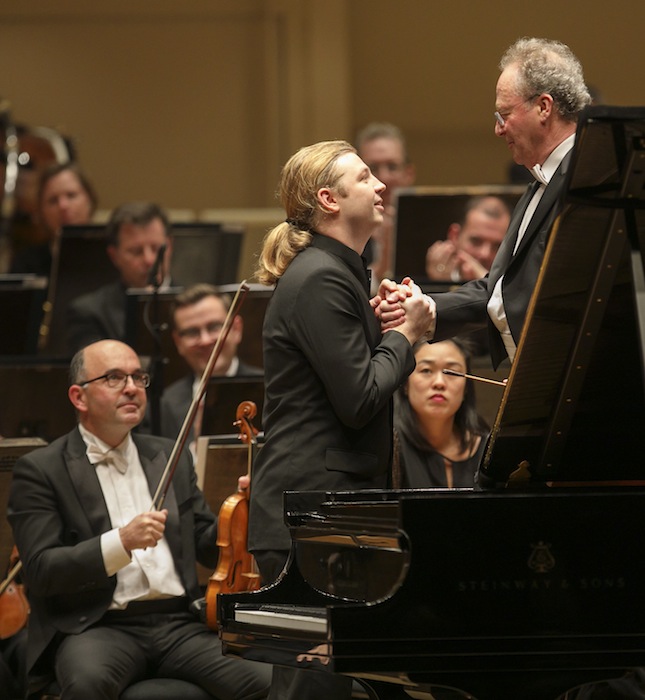Krivine, Kozhukhin light separate fires with CSO

The Chicago Symphony Orchestra is marking the debuts of several conductors this season, mostly younger maestri on their way up the music career ladder.
Thursday night at Orchestra Hall, however, marked the first CSO appearance of a veteran podium figure, Emmanuel Krivine. And the 69-year-old French conductor managed to strike blazing sparks with the players, elevating a humdrum program into one of the most exciting concerts of the season to date.
Krivine has guest conducted most of the world’s top orchestras and has held several positions in his native France; he takes the reins at the Orchestre National de France in the fall of 2017.
Born in Grenoble of Russian-Polish parentage, Krivine is a somewhat understated podium figure, conducting with a distinctive wrist-flicking style that managed to elicit surprisingly responsive and energized results.
Liszt’s orchestral tone poems have largely faded from concert programs, mercifully in the minds of many non-fans. Yet Thursday night Krivine managed to make even the tub-thumping Les Preludes sound like real music. The conductor brought the violin lines forward, imbued Liszt’s lyrical theme with Gallic elegance and downplayed the unhealthy vulgarity, while still building to a punchy and brilliant coda that somehow skirted bombast.
Few great composers of the 20th century wrote as many not-great works as Serge Prokofiev. The longest and least successful of his five works in the genre, Prokofiev’s Piano Concerto No. 2 surely qualifies. After a deep and expansive opening movement, the composer falls back into glitzy trivialities, with three scherzo-like movements offering show-offy bravura and little of depth.
Soloist Denis Kozhukhin did the impossible by making as strong a case as one will ever likely hear for this problematic work. The Russian pianist showed his sympathy for Prokofiev’s music two years ago performing the composer’s War Sonatas at Mandel Hall.
Thursday night’s concerto performance was an even more astounding display of unbridled keyboard virtuosity than that Hyde Park event. Kozhukhin is one of the most technically equipped pianists of our time, and he romped through the myriad challenges and digital landmines of this score with remarkable accuracy and finesse.
More strikingly, Kozhukhin brought a poetic sensibility to the music that made the concerto seem a more substantive piece. He built the long cadenza of the opening movement with skill and found more resonance in the contrasting sections of the finale than one thought the music contained. The concluding pages were simply spellbinding, Kozhukhin throwing off Prokofiev’s spiky virtuosity at a speed that often left his hands a blur. The close-knit, brilliant support by Krivine and the orchestra was on the same high level.
Vociferous cheers and four curtain calls brought the lanky pianist back out for a contrasted encore. Kozhukhin floated Scarlatti’s Sonata in C-sharp Minor, K. 247, with gentle feeling and glowing expression.
The CSO (then called the “Chicago Orchestra”) played its first performance of Antonín Dvořák’s Symphony No. 8 under the baton of the composer at the 1893 Columbian Exposition.
The popular work has had several memorable local outings since and the exhilarating performance delivered by Krivine and the musicians Thursday night was in that same fine tradition.
The French conductor led a cleanly scrubbed account of the score that made this familiar work emerge vibrant and freshly minted. Krivine favored fleet tempos, lean textures and a lack of sentiment, lights years removed from, say, the Italianate warmth of Carlo Maria Giulini’s recording of the Eighth with the CSO (DG).
Yet Krivine’s modern approach provided its own rewards, with the outer movements crackling with energy. Though often referred to as Dvořák’s “Pastoral” symphony, there are ample dark shadows in this score. Krivine was superb in the Adagio, assaying the pensive shifting expression of this inward music. The performance was rounded off with a rousing account of the finale, Krivine pushing down hard on the accelerator in the closing bars to thrilling effect.
The program will be repeated 8 p.m. Saturday and 7:30 p.m. Tuesday. cso.org; 312-294-3000.
Posted in Performances



Posted Nov 18, 2016 at 10:47 pm by Alan Strange
I agree entirely with this assessment, which is far superior to that of your colleague at the Tribune. Krivine’s reading of the Dvorak was thrilling and the orchestra responded magnificently.
Posted Nov 19, 2016 at 11:12 pm by Anne-Marie
I’ve just come from the Saturday performance. The whole program was exhilarating! Thank you for preparing us for this exciting concert. Both conductor and pianist were, as the French would say, “impeccables “!
Posted Nov 20, 2016 at 3:13 pm by Claude Weil
What was Saturday night’s encore. It was so lovely.
Posted Nov 20, 2016 at 10:32 pm by Rick
Claude, the Saturday encore was the same as Thursday’s – the Scarlatti sonata. I don’t recall when I’ve heard an audience remain as respectfully silent after the performance of a piece as for the encore on Saturday. Very moving.
On the other hand, the “many non-fans” of Liszt’s tone poems evidently were absent on Saturday because the performance of Les Preludes got an immediate and roaring response of approval.
Posted Nov 21, 2016 at 8:58 am by Brad
I basically agree, but in my opinion, the tempo choices for the Dvořák were generally fast to the point of feeling rushed. Maybe that created some excitement, but it also stripped some of the color and atmosphere from this great symphony. Aside from practically inaudible trumpets, the orchestra played well though.